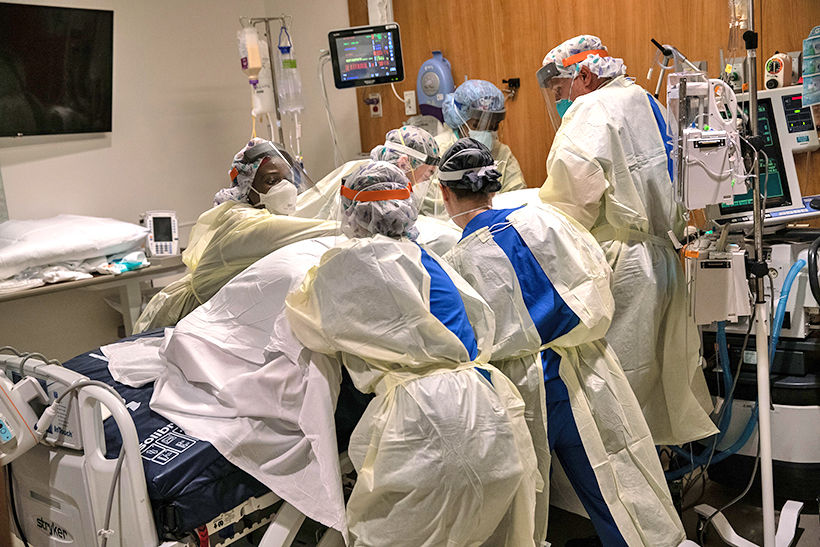US Covid-19 cases pass 1 million as Germany starts wearing masks – VIDEO

Covid-19 cases in the US passed the 1 million mark in the past 24 hours, with US President Donald Trump claiming that the high number are “because of better testing”. The outbreak has left tens of millions unemployed in the US and nearly 60,000 dead, by far the highest number of confirmed fatalities – well over a quarter of the global death toll of 218,000+.
At the same time hard-hit countries across Europe, and some south east Asia countries, are now looking towards easing lockdowns and lifting some restriction.
Meanwhile, facemasks are mandatory in all German shops from today. New cases rose there for the first time in 3 days as the government weighs removing more curbs on public life. Face coverings were already compulsory on buses, trains and trams.
“We all need to take care that we don’t end up with more infections.”
Germany is being closely watched around the world as data on infection rates shows mixed results.
France plans to begin reopening shops in May, while Spain is preparing for a “new normal” as Europe’s hardest-hit nation gradually eases restrictions over the next 8 weeks.
French PM Edouard Phillipe warns that even a gradual return to everyday economic activity is “risky,” despite the downward trend in virus deaths. Shops, markets and selected schools will reopen next month in France, with masks required on public transport and work-from-home orders in place for several more weeks.
Italy, Spain and France have been the worst affected European countries, each with more than 23,000 deaths. Sweden, which has taken a bold, yet laissez faire approach to the crisis and tried to keep business and some schools open, has nearly reached 20,000 cases.
Spanish authorities say restrictions would be slowly lifted over the next two months, while Italians will be able to exercise outdoors and visit relatives from next week, but hugs and handshakes will not be allowed (expect to see the Thai wai becoming a popular greeting around the world).
Excitement over a move toward “normality” is tempered in many places by fear of new outbreaks or a second wave, and by growing evidence of the economic devastation wreaked by the pandemic. Forecasts warn of the worst global recession in a century, with consumer demand gutted, spending power greatly reduced and travel and tourism in ruins.
British Airways is the latest airline to sound the alarm, saying it may have to cut its workforce by a third. And European plane manufacturer Airbus is foreshadowing mass job cuts due to the plunge in demand for new aircraft.
In Lebanon there is more urgent evidence of economic crisis, with protesters confronting soldiers in defiance of a nationwide lockdown.
“I came down to raise my voice against hunger, poverty and rising prices,” 41 year old Khaled, told AFP, saying he lost his job and couldn’t support his 3 children.
More than 3 million people worldwide are known to have caught the respiratory disease that first emerged in China in late December, but the actual figure is thought to be much higher as many countries only test the most serious cases.
China’s outbreak appears to be under control with no new deaths reported for 13 straight days and confirmed fatalities around 4,600, although much doubt has been cast on whether the numbers are accurate and some world leaders are blaming ‘China’ for the outbreak as a means of deflecting criticism of their delayed response to the pandemic.
Scientists are scrambling to develop better treatments and a vaccine for the disease, with myriad studies underway, including one by the US Department of Homeland Security into how ultraviolet radiation could be used as a treatment for the virus. The investigation was prompted by the US President’s remarks at a briefing last Friday about untested treatments that he believed deserved further experimentation.
While that research is yet published, and largely dismissed by scientists, Indonesians are soaking up rays like never before in the hope that the country’s plentiful tropical sunshine will fend off the disease. Accordiing to one housewife in Indonesia’s cultural capital Yogyakarta…
“I always avoided the sun before because I didn’t want to get tanned. But I’m hoping this will strengthen my immune system.”
SOURCES: Thai PBS World | Bloomberg
Latest Thailand News
Follow The Thaiger on Google News:


























